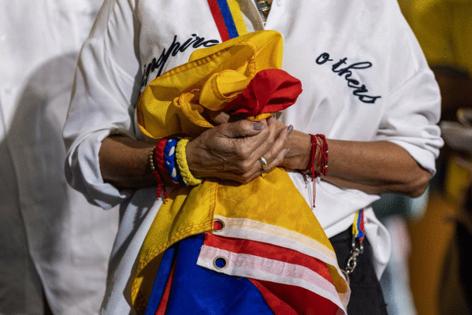Editorial: A court didn't buy the Trump administration's ugly rhetoric on Venezuelan TPS holders
Published in Op Eds
For now, hundreds of thousands of Venezuelans living legally in the U.S. and South Florida have gotten a reprieve after the courts put on hold the decision by the Department of Homeland Security to revoke their Temporary Protected Status.
More importantly, the courts so far have rebuked the Trump administration’s claims that allowing those migrants to remain in the U.S. “imposes irreparable injury” to the executive branch and the public.
President Donald Trump has spent his political career demonizing foreigners and relying on generalizations that programs like TPS — which provides legal status to people from countries like Venezuela facing oppressive regimes or turmoil — give the green light for an invasion of Latin American gang members into the U.S.
Last month, U.S. District Judge Edward M. Chen stopped the TPS revocation while a lawsuit filed by seven Venezuelans who have TPS goes through the courts.
On Friday, a San Francisco appeals court backed Chen’s decision, ruling that Trump administration officials “have not demonstrated that they will suffer irreparable harm” if the lawsuit moves forward, the Herald reported.
TPS recipients
This is good news for the 350,000 Venezuelan TPS holders who would have lost deportation protections on April 7. Of course, their fates could change as the lawsuit plays out. The Trump administration’s lawyers have argued that Department of Homeland Security Secretary Kristi Noem has the exclusive power to revoke the Biden administration’s decision to expand TPS for Venezuelans.
As important as Chen’s decision is what he wrote in his 78-page ruling: Noem’s decision to revoke TPS appears “predicated on negative stereotypes casting class-wide aspersions on (Venezuelan migrants’) character (insinuating they were released from Venezuelan prisons and mental health facilities and imposed huge financial burdens on local communities)...”
Venezuelan TPS beneficiaries have higher education attainment compared to U.S. citizens, with 40% to 54% holding a bachelor’s degree; they have high labor participation rates at 80% to 96%, “earn nearly all their personal income” and “annually contribute billions of dollars to the U.S. economy,” Chen wrote.
And, most importantly, those TPS holders “have lower rates of criminality than the general U.S. population,” he wrote.
The ruling reads like a point-by-point rebuke of the misconceptions Trump has convinced many Americans to believe about immigrants in general, despite studies over the years showing that they commit fewer crimes than U.S. citizens.
It also raises a bigger question: Why would Trump want to deport people with higher education, who are productive and not reliant on social services — the exact opposite of the stereotype of the migrant who comes to America to abuse the welfare system? When Trump talks about allowing immigrants into the U.S. based on merit, wouldn’t at least some of those Venezuelans qualify?
Of course, the U.S. shouldn’t allow Venezuelans to stay in the country under TPS only because many of them have college degrees. Temporary Protected Status was created to protect people escaping countries like Venezuela under the regime of Nicolas Maduro — or Haiti, whose TPS designation Trump is also trying to end. Revoking TPS would “inflict irreparable harm on hundreds of thousands of persons whose lives, families, and livelihoods will be severely disrupted,” Chen wrote about Venezuelans.
No doubt, any immigrant convicted of a serious crime or whose ties to a gang can be proven should be deported. It would be easy to get behind an effort to weed out bad actors abusing the TPS program while protecting the majority of others who are law-abiding. But this is not an effort to improve our immigration system, but to shut down legal avenues for people to immigrate to the U.S.
Chen’s ruling mentions several “discriminatory statements” made by Noem and Trump. In February, she posted on social media: “Venezuela didn’t send us their best. They emptied their prisons and sent criminals to America.”
Noem acted on the TPS program based on these “sweeping negative generalizations about Venezuelan TPS beneficiaries,” Chen wrote.
If a federal judge can call this ugly rhetoric for what it is — “the classic example of racism” — so can the rest of Americans.
_____
©2025 Miami Herald. Visit at miamiherald.com. Distributed by Tribune Content Agency, LLC.




























































Comments